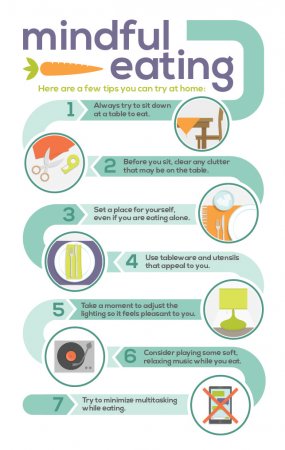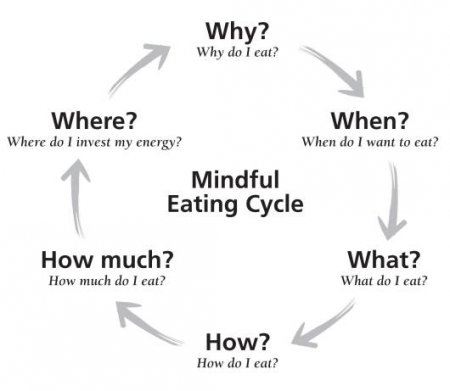Mindful Eating: What is Mindful Eating?
So, what is mindful eating?
Mindful eating is eating with intention and attention:
- Eating with the intention of caring for yourself
- Eating with the attention necessary for noticing and enjoying your food and its effects on your body
As you can see, mindful eating is much more than “eating slowly, without distraction.” While that’s certainly an important part of it, at Am I Hungry? Mindful Eating Programs and Training, we believe that mindful eating encompasses the entire process of eating:
Awareness of your physical and emotional cues
Recognition of your non-hunger triggers for eating
Learning to meet your other needs in more effective ways than eating
Choosing food for both enjoyment and nourishment
Eating for optimal satisfaction and satiety
Using the fuel you’ve consumed to live the vibrant life you crave
This broad application makes mindful eating a powerful tool for developing a healthier, happier relationship with food.
5 Benefits of Mindful Eating
1. Better Control Over Your Weight
Like I mentioned earlier, mindful eating isn’t all about weight loss. The bottom line is that when you tune in to your body’s real needs and put an end to stressful or emotional eating, you naturally start improving your eating habits and likely the weight generally takes care of itself. That’s probably the best side effect of mindfulness around food!
Whether you’re trying to lose weight fast in an unhealthy way, overeating or under-eating, you have lost track of your real bodily cues to hunger and fullness. When you engage in mindless eating, you’re not meeting your body’s needs in some way — whether this means neglecting to eat a variety of healthy foods, eating in line with your real calorie needs or helping yourself cope with stress. It might mean that you eat portion sizes that are too large or processed and heavy “comfort foods” too often, which makes you gain weight. But for some people, not practicing mindfulness around food can also lead them to under-eat or just to eat the wrong types of things.
2. Less Stressing About Food
Stress can sabotage your diet and fitness goals. Everyone deals with emotional eating to some degree. That’s a part of being human! We all love to eat, enjoy different foods and find comfort in our favorite meals. But some people can manage the natural desire to eat delicious foods better than others, figuring out how to include occasional indulgences in an otherwise healthy eating plan.
Just eliminating emotional eating can impact your weight and health immensely because it stops a vicious cycle. Awareness can help you avoid stressful eating because it teaches you to respond to situations instead of just reacting to them. You recognize your cravings but don’t need to let them automatically control you or determine your decisions.
3. More Satisfaction from Eating
Mindful eating reconnects you with your body’s signals and senses. Mindful eating plugs you back in to your pleasure around foods without letting you lose control. While it might seem counterproductive to try and experience even more satisfaction from eating, the more we pay attention, the less food we usually need!
4. No Need to “Diet” Ever Again!
While weight loss can definitely happen as a result of mindful eating, the real goal is to focus on giving your body what it needs, remaining healthy and, of course, feeling good! When you eat just the right amount needed to make your body function, without giving it too much or too little, you naturally settle at a healthy weight without needing to follow any “diet plan.” Fad diets and one-size-fit-all plans usually don’t work long term because they don’t teach you to manage your emotions and preferences.
5. Better Prevention and Management of Health-Related Conditions
According to certain studies, training in mindful eating can result in better self-management over diseases, including diabetes, digestive issues, eating disorders and more, that require specific dietary plans. For example, a 2013 study published in the Journal of the Academy of Nutrition Dietetics found significant improvements in quality of diet, modest weight loss and better glycemic control in diabetic patients after undergoing mindfulness-based training.
The availability of effective mindful eating treatments allowed diabetes patients better control over their own choices in meeting their self-care needs. In other words, mindfulness acted like a complimentary natural diabetes treatment when the diabetic patients became more aware of what they were eating, why they were eating, how much and what they could do to change. They better managed their food intake and blood sugar levels when becoming more attuned to their own habits.
5 Easy Tips To Get Started
- Eat slower
Eating slowly doesn’t have to mean taking it to extremes. Still, it’s a good idea to remind yourself, and your family, that eating is not a race. Taking the time to savor and enjoy your food is one of the healthiest things you can do. You are more likely to notice when you are full, you’ll chew your food more and hence digest it more easily, and you’ll probably find yourself noticing flavors you might otherwise have missed. If you have young children, why not try making a game of it — who can chew their food the longest? Or you could introduce eating with chopsticks as a fun way to slow things down.
- Savor the silence
Yes, eating in complete silence may be impossible for a family with children, but you might still encourage some quiet time and reflection. Again, try introducing the idea as a game — “let’s see if we can eat for two minutes without talking” — or suggesting that one meal a week be enjoyed in relative silence. If the family mealtime is too important an opportunity for conversation to pass up, then consider introducing a quiet meal or snack time into your day when you can enjoy it alone. The NYT article, for example, noted that one dietitian simply savors a few sips of tea in complete silence when she is too busy for a complete mindful meal.
- Silence the phone. Shut off the TV
Our daily lives are full of distractions, and it’s not uncommon for families to eat with the TV blaring or one family member or other fiddling with their iPhone. Consider making family mealtime, which should, of course, be eaten together, an electronics-free zone. I’m not saying you should never eat pizza in front of the TV, but that too should be a conscious choice that marks the exception, not the norm.
- Pay attention to flavor
The tanginess of a lemon, the spicyness of arugula, the crunch of a pizza crust — paying attention to the details of our food can be a great way to start eating mindfully. After all, when you eat on the go or wolf down your meals in five minutes, it can be hard to notice what you are even eating, let alone truly savor all the different sensations of eating it. If you are trying to introduce mindful eating to your family, consider talking more about the flavors and textures of food. Ask your kids what the avocado tastes like, or how the hummus feels. And be sure to share your own observations and opinions too. (Yes, this goes against the eating in silence piece, but you don’t have to do everything at once.)
- Know your food
Mindfulness is really about rekindling a relationship with our food. From planting a veggie garden through baking bread to visiting a farmers market, many of the things we locavores have been preaching about for years are not just ways to cut our carbon foodprint, but also connect with the story behind our food. Even when you have no idea where the food you are eating has come from, try asking yourself some questions about the possibilities: Who grew this? How? Where did it come from? How did it get here? Chances are, you’ll not only gain a deeper appreciation for your food, but you’ll find your shopping habits changing in the process too.

